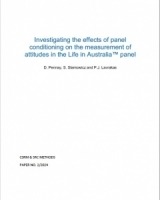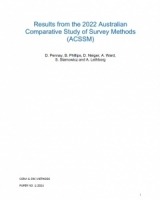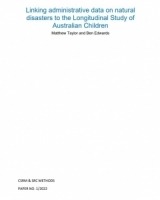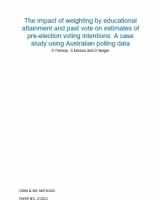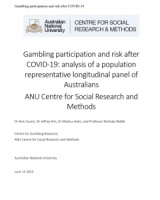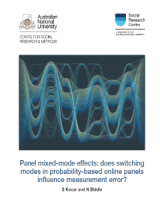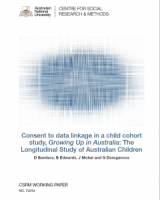Methods research papers
Investigating the effects of panel conditioning on the measurement of attitudes in the Life in Australia™ panel
Author/editor: Pennay, D, Slamowicz, S, Lavrakas, P.J
Year published: 2024
As evermore survey research is undertaken via online panels, including probability-based ones, an issue facing researchers is the possibility that data quality could be changed by panel conditioning effects that may arise from repeatedly interviewing the same respondents over time. This may...
Results from the 2022 Australian Comparative Study of Survey Methods (ACSSM)
Author/editor: Pennay, D, Phillips, B, Neiger, D, Ward, A, Slamowicz, S, Lethborg, A
Year published: 2024
Many studies comparing the accuracy of survey estimates generated from probability-samples and non-probability samples have been undertaken over the last 15 years. This study (the Australian Comparative Study of Survey Methods – ACSSM) is one of only a few to build upon a previous study, thereby...
Linking administrative data on natural disasters to the Longitudinal Study of Australian Children
Author/editor: Taylor, M, Edwards, B.
Year published: 2022
This paper introduces a new data set on Australian natural disasters obtained from the Australian Government Department of Home Affairs’ Disaster Assist website (DisasterAssist.gov.au). Disaster Assist contains information on natural disasters declared by State and Territory governments under the...
The impact of weighting by educational attainment and past vote on estimates of pre-election voting intentions: A case study using Australian polling data
Author/editor: Pennay, D, Misson, S & Neiger, D
Year published: 2021
The use of statistical adjustments (‘weighting’) to reduce bias in the estimates of voting intentions produced by pre-election opinion polls is an important issue for pollsters to consider. The weighting of pre-election polls was one of the main issues explored in the recent inquiry into the...
The Effects of Mode on Answers in Probability-Based Mixed-Mode Online Panel Research: Evidence and Matching Methods for Controlling Self-Selection Effect in a Quasi-Experimental Design
Author/editor: Kocar, S, Biddle, N & Phillips, B
Year published: 2021
Online probability-based panels often apply two or more data collection modes to cover both online and offline populations. They do so with the aim of obtaining results that are more representative of the population of interest, in most cases the general population, than Web mode only. This study...
A new method of estimating the number of Indigenous business owner-managers
Author/editor: Shirodkar, S, Hunter, B & Foley, D
Year published: 2020
Accurate estimates of the size of the Indigenous business sector are valuable for policy makers, practitioners and academics. Such estimates provide one measure of Indigenous economic advancement. A difficulty in developing these estimates has been a lack of suitable data for calculating key...
Longitudinal Study of Indigenous Children (LSIC) technical report: education
Author/editor: Biddle, N, Edwards, B, Lovett, R, Radoll, P, Sollis, K & Thurber, K
Year published: 2020
This report evaluates the education measures in the Longitudinal Study of Indigenous Children (LSIC). Education measures in the LSIC were found to be internally valid and perform as expected. The LSIC is a robust dataset that, if used carefully, can improve our understanding of the development of...
Panel mixed-mode effects: does switching modes in probability-based online panels influence measurement error?
Author/editor: Biddle, N & Kocar, S
Year published: 2020
Online probability-based panels often apply two or more data collection modes to cover online and offline populations, and to collect data from onliners who do not respond online in time to contribute to a given wave. As a result, offline/online status can change during the life of the panel for...
Consent to data linkage in a child cohort study, Growing up in Australia: The Longitudinal Study of Australian Children
Author/editor: Bandara, D, Edwards, B, Mohal, J & Daraganova, G
Year published: 2019
In this paper, we provide new evidence on the factors associated with consent to data linkage in young people from a sample of 16–17-yearolds (born in 2004) participating in Growing Up in Australia: The Longitudinal Study of Australian Children. To our knowledge, this survey is the first time...
Longitudinal Study of Indigenous Children (LSIC) technical report: education
Author/editor: Biddle, N, Edwards, B, Lovett, R, Radoll, P, Sollis, K & Thurber, K.
Year published: 2019
Globally, Australia’s Longitudinal Study of Indigenous Children (LSIC) is the only longitudinal child cohort study on the developmental outcomes of Indigenous children. The study surveys Aboriginal and Torres Strait Islander Australian children aged either 6–18 months (B cohort) or 3.5–5 years (K...



